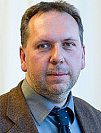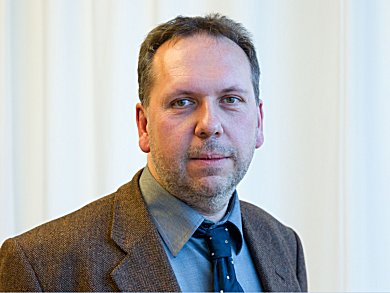Dr. Ralph Nonninger is president of the Deutscher Verband Nanotechnologie e.V. (DV Nano, German Association of Nanotechnology), which was founded in November 2011. DV Nano provides representation on a national level for people working within the fields of nanotechnology and nanoscience.
Dr. Vera Koester talks to him for ChemViews magazine about the role of DV Nano, why nanotechnology is essential for our future, and how nanotechnology is developing.
What makes nanotechnology so important in your opinion?
Nanotechnology will provide solutions for society’s major challenges in the future such as energy generation and storage, health, drinking water, or mobility. These issues can hardly be resolved without nanotechnology.
We are confronted with problems such as ensuring our energy supply, use of renewable energy sources, ensuring food and drinking-water supply, which will inevitably impact our society – even shake it to its core. If we seek to continue to develop technologically and to improve our standard of living and also extend it to those regions which do not yet possess our standard, then the significance of the cross-disciplinary technology of nanotechnology becomes increasingly apparent.
What interests you personally about nanotechnology?
I am impressed by the speed and the extent to which this technology is changing our lives. For instance, nanotechnology enables the storage of enormous quantities of data on a hard drive. Within just ten years, this new generation of hard drives has become accepted as the prevailing standard. In the past, it took much longer for new developments like the television or the telephone to become so indispensable to our everyday lives.
And where do you see the field heading?
The latest generation of micro-chips is equipped with more than two billion transistors which, for their part, are merely 30 nanometers in size. In the future, semiconductors will no longer be used in chips; these will be replaced by photonic crystals which operate with light instead of with electrons. This is just one area where rapid progress can be seen. We are now also finding that diseases can be cured by way of targeted manipulation of intracellular processes on the nanometer scale.
You are President of the Deutsche Verband Nanotechnology (DV Nano). Can you tell us a bit about this association?
DV Nano is the professional association for the work force in the field of nanotechnology from economy, sciences, media, education and administration. Nanotechnology is seen as a cross-section discipline which especially combines chemistry, physics, biology, medicine, and materials sciences.
As noncommercial and independent organization, the DV Nano is the contact for academic/scientific, technical, job-related and sociopolitical questions. The association supports the exchange between industry, science, society, administration, politics and its members. By this it contributes to strengthening innovation within Germany.
What is unique about the DV Nano?
In contrast to the growing economic significance of nanotechnology itself, there is a lack of advocacy for those who decisively shape this technological development – scientists, entrepreneurs, technicians/engineers, and laboratory workers. The professional association DV Nano seeks to give these people a voice.
While previously companies and research facilities have been represented by networks and skills centers grouped around regions or topics, the representation of individual interests has been lacking. We have closed this gap by founding our professional association.
Who can become a member?
Any individual who truly cares about nanotechnology and seeks to become involved in the national and international debate on nanotechnology can join this association.
How do you connect your members?
We consider one of our main roles as facilitating networking between our members. This will be achieved by establishing working groups as well as by hosting regular special events, conventions and through continuing-education. To complement its work, the association also publishes a bi-monthly journal.
Can companies join the DV Nano?
Companies, particularly small and mid-sized companies, are certainly welcome to join. However, they would be classed differently compared with individuals. While individuals are full members, companies could only be accepted as supporting members.
We co-operate closely with the Verband der Chemischen Industrie (VCI), an advocacy organization representing the chemical industry, with a primary focus on large-scale industrial operations.
Will the DV Nano have any impact on the government or funding situation?
Among its other roles, this association is dedicated to creating transparency: Where are things happening within the nanotechnology sector in Germany? Who are the most significant players? Which are the most significant colleges and universities? Where are the prevailing statutory rules not yet sufficient?
DV Nano co-operates closely with official agencies and NGOs – and issues recommendations as to which areas should be researched and manifested in statutory form.
How does the public in Germany regard nanotechnology?
In the past few years, the perception of nanotechnology by the general public has changed. Critics who primarily emphasize the risky aspects of nanotechnology are becoming louder although nanotechnology is omnipresent and society’s major challenges can hardly be tackled without nanotechnology.
DV Nano aims to encourage a discussion on the topic “opportunities vs. risks” in Germany by taking a proactive stand and highlighting the opportunities. Of course, we will also continue to focus on avoiding and understanding any hazards to people and the environment which may be posed by any new technology.
What goals do you aim to achieve within the next few years?
We are trying to combine all available expertise and skills as well as all regional organizations to form a large, nation-wide syndicate. We need a strong national lobby to speak with one voice and to be heard by official agencies, consumers, and anyone else debating various aspects of nanotechnology. This is important to maintain the position Germany has in the competitive international community and to be able to strengthen this position.
How do you see the nanotechnology sector in Germany compared to other countries?
Germany is an international leader in nanotechnology. As a nation, we have the responsibility for developing this position by intensifying research and encouraging entrepreneurs to develop market-ready products, thereby creating secure jobs relevant to the challenges of the future. Nanotechnology will continue down this path on a worldwide scale, so Germany should be a part of it.
Thank you for the interview!
 Ralph Nonninger holds a Ph.D. in chemistry and began his career in nanotechnology in the 1990s at the Leibniz Institute for New Materials, Saarbrücken, Germany, one of the centers of excellence for nanotechnology in Germany. From 1998, Nonninger was the head of the ceramic department, where he was responsible for all areas dealing with the production of nanoparticles and their processing into products from high-performance ceramics, adhesives, and composite polymer segments. Nonninger joined ItN Nanovation AG, Saarbrücken, in 2001 as one of the company’s founders and was responsible for research and development. Since 2011, he has been the head of cc-NanoBioNet, the largest nanotechnology network in Germany created by the merger of the NanoBioNet and cc-NanoChem networks.
Ralph Nonninger holds a Ph.D. in chemistry and began his career in nanotechnology in the 1990s at the Leibniz Institute for New Materials, Saarbrücken, Germany, one of the centers of excellence for nanotechnology in Germany. From 1998, Nonninger was the head of the ceramic department, where he was responsible for all areas dealing with the production of nanoparticles and their processing into products from high-performance ceramics, adhesives, and composite polymer segments. Nonninger joined ItN Nanovation AG, Saarbrücken, in 2001 as one of the company’s founders and was responsible for research and development. Since 2011, he has been the head of cc-NanoBioNet, the largest nanotechnology network in Germany created by the merger of the NanoBioNet and cc-NanoChem networks.
Dr. Nonninger has published numerous articles and holds more than 120 patents and patent applications. He is president of the Deutscher Verband Nanotechnologie e.V. (DV Nano, German Association of Nanotechnology), which was founded 3 November 2011.




